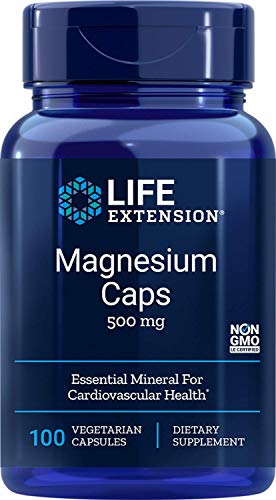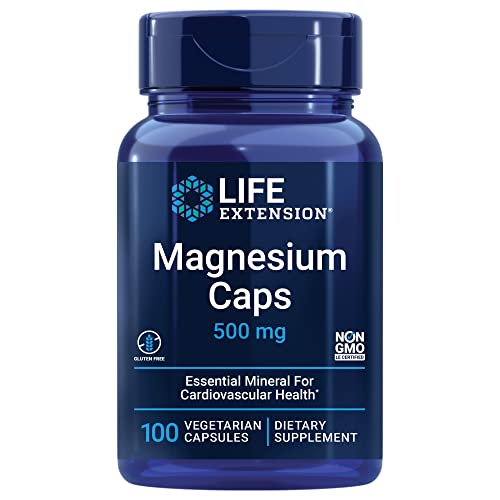Lots of individuals have difficulty sleeping, and breaking the cycle of sleeplessness can be difficult.
You may try altering your sleep pattern and limiting your caffeine consumption, but occasionally these lifestyle interventions fall short.
Nutritional supplements are another popular alternative. 1 supplement that has gained some attention as possible sleep support is magnesium.
This nutrient has wide-ranging effects within the human body and might affect a few of the procedures that encourage sleep.
So what is the Best Magnesium For Sleep?
What Is Magnesium?
Magnesium is one of the most frequent minerals in the world and is found in several foods.
It is crucial for human health and can be utilized in over 600 mobile reactions throughout the human body.
In reality, every organ and cell needs this nutrient to operate properly. It results in bone health, in addition to proper mind, muscle, and heart function.
Magnesium supplements are linked to numerous advantages, such as combating inflammation, relieving constipation and lowering blood pressure.
Additionally, magnesium can help treat sleep issues.
Various kinds of magnesium supplements are all readily available. These include magnesium citrate, magnesium oxide, and calcium chloride.
Overview:
Magnesium is an important mineral that’s essential for total wellness. The advantages of these nutritional supplements vary from fighting inflammation and lowering blood pressure into potentially improving sleep.
It May Helps Your Brain and Body Relax
To be able to fall asleep and stay asleep, your body and mind should unwind.
On a chemical level, magnesium assists this process by activating the parasympathetic nervous system, the machine accountable for getting you relaxed and calm.
To begin with, magnesium regulates neurotransmitters, which send signals through the nervous system and mind.
In addition, it modulates the hormone melatonin, which guides sleep-wake cycles on the human body.
Secondly, this nutrient binds to gamma-aminobutyric acid (GABA) receptors. GABA is the neurotransmitter responsible for firming nerve action. It’s precisely the identical neurotransmitter used by sleeping medications such as Ambien.
By helping to calm the nervous system, magnesium might help prepare your body and head for sleep.
Overview:
Magnesium aids trigger radicals which are responsible for soothing the body and the brain.
Not Getting Enough of It Interferes With Sleep
Not having sufficient magnesium in the body can cause distress to sleep and even sleeplessness.
Studies in mice have revealed that optimum levels of the mineral are required for regular sleep also that both low and high levels can lead to sleep difficulties.
Particular groups of individuals have a greater risk of calcium deficiency, such as (two ):
People with digestive ailments: Problems with your digestive tract may cause the human body to not absorb minerals and vitamins correctly, leading to deficiencies.
Individuals with diabetes Insulin resistance and diabetes have been connected with excessive calcium reduction.
People with alcohol addiction: Deficiency in this vitamin is not uncommon among people who drink heavily.
Older adults: Most older adults consume less calcium in their diets compared to younger adults and might also be less effective at absorbing it.
If you are not getting enough magnesium, you might experience sleep issues.
Overview:
Insufficient magnesium consumption is associated with sleep difficulties. Some people are especially at risk of deficiency.
It Helps Curb Sleep Quality
Not only does magnesium enable you to get to sleep, but it also plays a role in assisting you to attain deep and restful sleep too.
In 1 study, elderly adults have been given 500 milligrams of calcium or a placebo. All in all, the magnesium group had a greater quality of sleep.
This class also exhibited high levels of renin and melatonin, two hormones that help regulate sleep.
These outcomes were bolstered by yet another study that gave older adults with insomnia a supplement containing 225 mg calcium, 5 mg ginseng, and 11.25 mg ginseng.
The participants of the second research also had greater sleep when compared with the placebo group, though it’s difficult to attribute the impact of calcium because the supplement also comprised serotonin and zinc.
Still another study found that producing a calcium deficiency in mice led in sleep patterns which were mild and restless.
This is partly because of this mineral’s impact on the nervous system. It blocks excitable molecules from binding to nerves, leading to a calmer nervous system.
But because the present research has just studied calcium nutritional supplements among older adults with insomnia, it is not clear whether younger adults might benefit also.
Overview:
Magnesium works on the nervous system also lead to deep, restful sleep. Some studies have confirmed this effect in elderly adults.
It May Help Alleviate Stress and Depression
Stress and depression can have a negative effect on sleep. Lately, magnesium has been shown to help alleviate both of mood disorders.
This is particularly true whenever there’s a calcium deficiency because nervousness, depression, and mental confusion are usually seen during lack.
But the emerging study also suggests this mineral could improve traditional antidepressant therapy and potentially cure anxiety.
While these works are not fully known, it is apparently associated with magnesium’s ability to excite the calming apparatus of this nervous system.
If your insomnia is related to an underlying mood disorder, then magnesium only might help.
Overview:
Magnesium can help treat depression and anxiety, two mood disorders which may lead to sleep issues.
It May Helps Alleviate Muscle Health
Magnesium functions in conjunction along with other vital vitamins and minerals such as potassium and calcium. As a result of this, magnesium plays a vital part in how well your muscles including your heart operate.
Furthermore, magnesium helps your muscles to contract and consequently, create energy and protein. That is because magnesium functions with over 300 enzymes in the human body to let it work correctly.
Sources of Magnesium
Ideally, many experts advocate obtaining the dose of calcium from your meals. In reality, some research indicates that individuals who regularly consume a healthy, balanced diet will probably not suffer from calcium deficiency in any way.
Regardless, there are lots of ways to your calcium consumption if you would like to control or boost this crucial nutrient on your system; many common are supplements and diet.
Magnesium in Food
If you are looking to your calcium intake, then examine your diet. Harvard Medical School reports that many people get enough calcium from a nutritious diet with foods high in calcium.
As stated by the National Institute of Health, some processed foods strip off nutrients, radically lowering the calcium content inside the meals. We recommend eating whole, unprocessed foods to the ideal source of dietary magnesium.
Water tap, bottled or mineral may be another superb source of dietary magnesium. But not all water is created equal, as the quantities of magnesium within the water might vary by location and brand.
The US Department of Agriculture has identified the following foods since the richest in calcium, listed in descending order: almonds, spinach (boiled), cashews, peanuts, and shredded wheat cereal.
Magnesium-rich foods comprise:
- Dark leafy greens
- Seeds and nuts, particularly cashews, almonds, sunflower, and sesame seeds
- Squash broccoli
- Peanut butter
- Legumes
- Soymilk
- Dairy
- Avocado
- Bananas
- Salmon, halibut
- Steak, chicken breast
Supplemental Magnesium
If your diet is not providing you with the recommended daily dose of the vital mineral, many supplemental alternatives for magnesium can be found at the regional drug store. Once it comes in several forms, all which will help regulate your GABA levels and cause restful sleep, understanding the various forms of dietary supplements available may be useful.
When you are creating your choice either online or in the pharmacy, remember that some magnesium supplements incorporate a mix of different kinds of magnesium, whereas a number you can buy individually.
Magnesium Glycinate
Glycine is just another sleep-inducing amino acid. 1 form of nickel is magnesium glycinate. This is only one of the most absorbable forms of calcium it is possible to take. Various studies have demonstrated that glycine enhances sleep quality and promotes natural, healthful sleep patterns, such as healthful REM cycles.
Magnesium glycinate is usually contained in several over the counter calcium supplements, but always make sure you check, since it’s recommended especially for enhancing sleep.
Magnesium Citrate
Did feeling stress or stressed? Look at upping your calcium citrate intake.
Many common calcium nutritional supplements include magnesium citrate. Besides soothing muscle cramps, magnesium citrate has soothing properties, assisting your body and mind unwind.
Magnesium Oil
Magnesium oil is a topical treatment that could help relax your muscles in addition to enhance the health of your skin. It is most frequently a combination of water and calcium chloride. A lot of men and women use it to its calming functions in bathrooms or as topical petroleum, as it is also sold in a spray type.
While no concrete studies have demonstrated the advantages of coconut oil, it’s still a popular alternative for a calcium supplement.
Other common types of magnesium contain magnesium sulfate (found in Epsom salts), magnesium oxide, magnesium threonate, and calcium malate. If you are unsure or encounter any negative side effects, make sure you speak to your physician.
How to Require Magnesium to Aid With Sleep
The Institute of Medicine indicates a daily dietary consumption of 310360 milligrams of calcium for mature women and 400420 mg for adult men.
You are able to get magnesium via drinking water and eating foods like green vegetables, grains, nuts, fish, poultry and fruit.
Not many studies have tested the impact of magnesium supplements on sleeplessness, which makes it difficult to recommend certain quantities.
On the other hand, the above clinical trials utilized amounts in the assortment of 225500 mg. The top limit considered secure from nutritional supplements is really 350 mg every day, therefore avoid wanting this higher dose without medical oversight.
As it is apparent that magnesium deficiency can impair sleep, a fantastic first step is to be certain that you’re getting sufficient amounts from foods that are whole.
Overview:
There are no special recommendations on just how much sodium to choose to increase sleep. But, getting sufficient amounts through diet can help.
What Happens If You Don’t Have Enough Magnesium?
A 2012 study by the International Life Sciences Institute reported some health dangers from a calcium deficiency include type 2 diabetes, obesity, migraine headaches, asthma, colon cancer, and hypertension to list a couple.
Cardiovascular disorder: Though the incidence of coronary disease is equally catastrophic and widespread, studies have revealed that high levels of magnesium demonstrated a decreased risk of cardiovascular disease and cardiovascular disease.
Hypertension: Low calcium levels for a protracted-time period could possibly be correlated with hypertension and cardiovascular disease. While studies have demonstrated that supplemental sodium along with a diet of magnesium-rich foods just helped reduce blood pressure slightly, we urge a lifelong effort of keeping healthy magnesium levels.
Stroke: A study showed that high doses of calcium (an extra 100 mg per day) decreased the risk of stroke by 8 percent in the research participants.
Type 2 diabetes: Because of magnesium’s crucial role in balancing sugar levels, diets full of magnesium are connected to a considerably lower risk of diabetes, according to the National Institutes of Health.
Osteoporosis: As it activates the crucial, bone fortifying elements present in vitamin D, magnesium is essential to healthy bone growth, and has additionally been proven to ward off osteoporosis.
Possible Interactions: Though research in this region is restricted, there’s sufficient evidence to support the thought that magnesium treatment large doses of calcium prescribed by a health care professional might be beneficial in treating migraine pain.
Additional Health Benefits of Magnesium
Though a routine of greater, restorative sleep can improve your total wellness, magnesium also arouses extra health benefits.
Magnesium helps over 300 enzymes in our bodies, keeping you feeling healthy and balanced. Added physical and mental benefits include:
- Lower pressure, better disposition
- Bone health
- Metabolic Wellbeing
- Pain relief
- Better attention span
- Better athletic performance
Potential Side Effects
Like with everything, moderation is essential. Always make sure you follow the recommended dosages and any guidance from the health care provider.
Some people today experience stomach cramping after carrying an excessive amount of magnesium (approximately 600 milligrams per day). This high dose, particularly nutritional supplements with high doses of calcium oxide, can cause a laxative effect, paradoxically keeping you up at nighttime, instead of supplying the sleep-inducing advantages it is famous for.
Although your body will obviously void any surplus minerals and vitamins, your kidneys make sure you do not excrete too much salt due to your body’s demand for this. Even still, we advocate being mindful of just how much you are consuming frequently, and always speak with your physician if you have additional questions.
Some medications interact badly with calcium, so make certain to consult your health care provider prior to starting any supplemental regime. In case you’ve got chronic kidney disease, we recommend just using nutritional supplements prescribed by your physician.
5 Best Magnesium For Sleep
1. Natural Rhythm Triple Calm Magnesium
Triple Calm Magnesium - 150mg of Magnesium Taurate, Glycinate, and Malate for Optimal Relaxation, Stress and Anxiety Relief, and Improved Sleep. 120 Capsules.
$21.87 in stock
PROS
- Combines different kinds of magnesium
- Very Capable of resolving sleep-related Troubles
- Fantastic value for money
CONS
- Just comes from 150mg capsules
2. Life Extension Magnesium
PROS
- Highly affordable
- Successful at resolving sleep Problems
- Enormous 500mg per pill
CONS
- Potential stomach and digestive Difficulties
3. MSport Magnesium
PROS
- Increased absorption
- Enriched with vitamins
- Helps most muscle Difficulties
CONS
- Might not be effective at non-muscle-related Issue
4. Pure Encapsulations Magnesium (Glycinate)
Life Extension Magnesium 500mg, 100 Vegetarian Capsules
PROS
- Pure magnesium glycinate
- Successful at resolving various sleep Problems
- Free of gut issues Ordinarily
CONS
- A bit pricy
- Might result in a rash breakout
5. Morning Pep Magnesium
High Absorption Magnesium for Leg Cramps and Sore Muscles, Restless Leg Syndrome Relief (RLS), Muscle Relaxer with Vitamin B6, D and E, 380mg Magnesium Oxide Monohydrate, 60 Servings
$17.47 in stock
PROS
- Potent Mix of magnesium chelates
- Cheap
- Effective against a Vast Array of issues
- 90day money-back guarantee
CONS
- Conventional but maybe not the fanciest inactive ingredients
The bottom line
Magnesium plays an essential role in human health. Low amounts are associated with numerous adverse consequences, such as depression, cardiovascular disease, and diabetes.
Therefore, you might wish to think about supplements if you are not getting enough of the mineral in your diet plan.
Many types exist, a few of which might help alleviate heartburn, constipation, arthritis, and other disorders. If you are not certain which one is ideal for you, ask your physician.




























